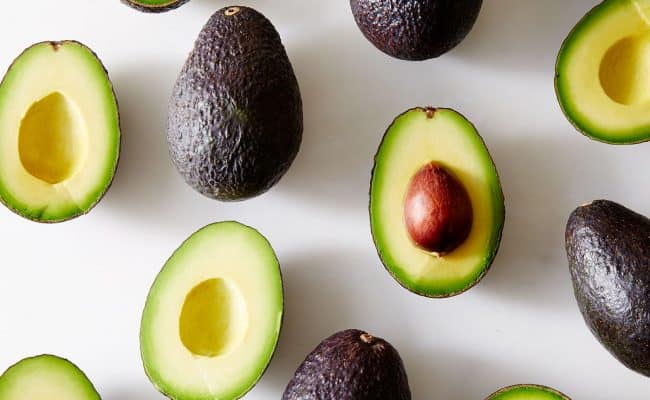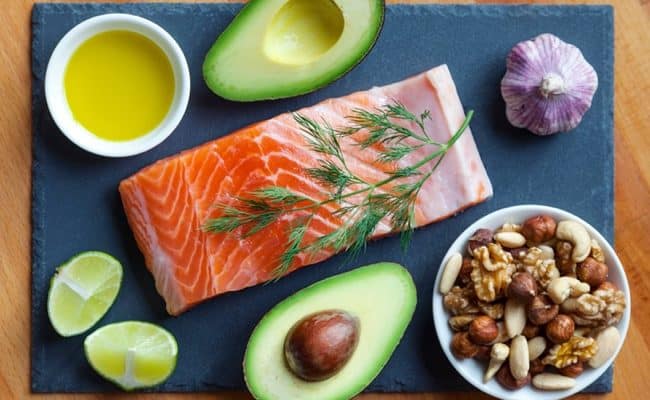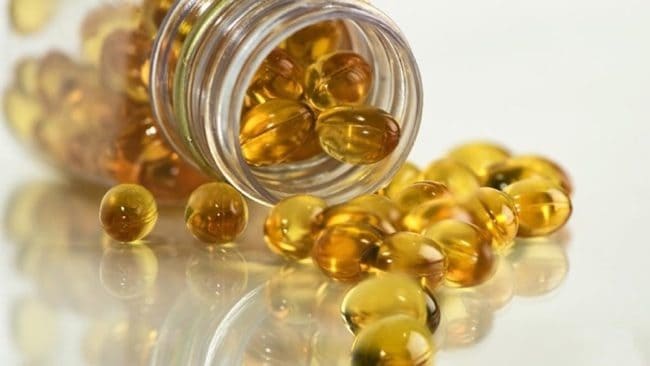
Omega 3 and omega 6 fatty acids are considered essential fatty acids. We need these fatty acids for survival, and the body does not make them. Some of the functions of omega 6 include: stimulating skin and hair growth, regulate metabolism and promote inflammation. Omega 3 functions include: brain development, part of cell membranes, cognitive health and lowering inflammation.
The intake of omega 3 and 6 fatty acids should be relatively balanced, but unfortunately most people following a Western style diet get too much omega 6 and not enough omega 3.
In fact, a typical Western diet provides 14 to 25 times more omega-6 fatty acids than omega-3 fatty acids (1).
The total amount of omega 3 is important but so is the ratio of omega 6 to omega 3. A ratio between 2:1 or 4:1 of omega 6 to omega 3 is recommended.
Omega 6 food sources include vegetable oils common in many processed foods like safflower, corn and soy oil. Omega 3 food sources include cold water fish, olive oil, flaxseed, chia seeds, hemp seeds and nuts.
Many research studies have concluded getting enough omega 3 fatty acids can be beneficial for heart health, brain function and may protect against other chronic diseases.
Research is still shedding light on the recommended intake of omega 3’s, and how much omega 3’s you need daily can depend on individual health issues.
General recommended daily intake
Two sources of omega 3 include docosahexaenoic acid (DHA) and eicosapentaenoic acid (EPA). While there isn’t a clear established recommended intake for omega 3’s, most health organizations suggest getting around 500 mg of DHA and/or EPA every day for healthy adults.
Alpha linolenic (ALA) acid is also an omega 3 source, but ALA appears to be less potent than DHA and EPA (2). Food sources of ALA include canola oil, flax oil, walnuts and soybeans.
In order to get the recommended amount of omega 3’s, the American Heart Association (AHA) suggests eating 2 servings of fatty fish per week. Fatty fish high in EPA and DHA include sardines, mackerel, salmon and albacore tuna.
If you don’t eat fish, eating other food sources of omega 3’s is recommended.
Recommended intake for heart health
Someone with heart disease or high triglycerides may benefit from a higher intake of omega 3’s. The AHA suggests getting 1,000 mg of a combination of DHA and EPA per day for people with heart disease, and up to 2,000-4,000 mg of a combination of DHA and EPA per day for high triglycerides. Someone with abnormal heart rhythms may also benefit from a higher omega 3 intake of 2,000 mg per day or more.
If you have heart health issues, speak with your health care team for the best level of omega 3’s for you. Other medications, health conditions and diet may affect the level of omega 3’s that would be best for your personal health.
For higher daily omega 3 recommendations, taking a supplement may be recommended. However, before you take a supplement, speak with your health care team.
Other health conditions and daily omega 3 intake
Besides heart health, many other health conditions may benefit from a higher daily intake of omega 3’s. Researchers are continuing to understand how omega 3 and omega 6 intakes influence health and what the intake should be for both.
For now, some studies mentioned by the University of Michigan (3) have shown benefit of higher intake of omega 3’s for different health conditions, although more research is needed. Taking about 3,000mg of EPA and/or DHA daily may be beneficial for people who suffer from anxiety or rheumatoid arthritis.
People with eczema may also benefit from a higher intake of omega 3’s, maybe even up to 1,800 mg per day.
Other conditions such as lupus, epilepsy, osteoporosis cystic fibrosis, Crohn’s disease or bipolar disorder may benefit from higher intakes of omega 3’s.
Conclusion: Do you need to take a supplement?
Getting about 500 mg of omega 3’s per day through the diet can be possible, but some people may find it challenging. A reality for most Americans is eating fatty fish at least twice a week that is sustainably and wild caught can be challenging.
Farmed fish can be a source of omega 3’s as well, but the amount of omega 3’s may or may not be as much as wild caught fish. The concern for harmful contaminants in fish can be a concern, and there may be other ethical concerns with eating farmed fish. As of now, both types of fish are considered safe and a source of omega 3’s (4).
Getting enough omega 3’s from vegetarian sources can be possible, but specific guidelines for exact amounts of vegetarian food sources are yet to be determined. Following a Mediterranean diet can be one way to naturally increase your intake of plant based omega 3 foods.
Think of adding chia seeds and hemp seeds to your diet as well for an additional omega 3 source.
Remember the ratio of omega 6 to omega 3 intake is an important consideration besides total omega 3 amount. Balancing your omega 6 to omega 3 intake to about 4:1 instead of a typical Western diet ratio of at least 14:1. Switching foods that are higher in omega 6 for foods that are higher in omega 3’s can be a simple way to get more omega 3’s in your diet.
If you have a health condition that may benefit from a higher intake of omega 3’s, your physician may recommend fish oil (or another omega 3 source) supplement.
However, before you start taking a fish oil or other omega 3 supplement, consult your physician first especially if you are on any medication. It is not recommended to take more than 3,000 mg of omega 3’s without the supervision of a physician (5).
Keep in mind with fish oil supplements the amount of fish oil is not the omega 3 serving; it is the EPA and DHA amount.










